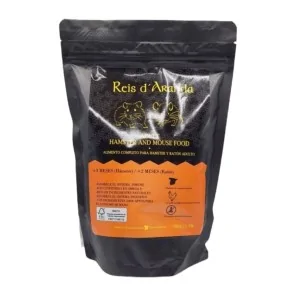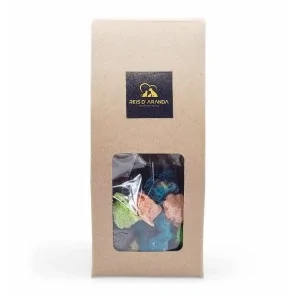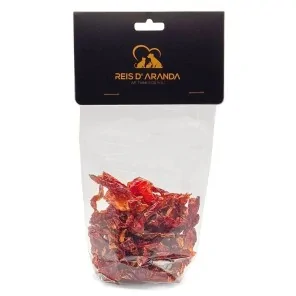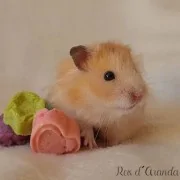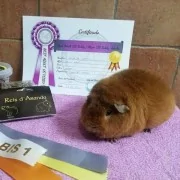The Tornjak originated from genetically homogeneous, almost extinct, indigenous shepherd dogs. These dogs have...
Recommended hamster food
What is the right food for a hamster?
Hamsters are adorable little pets that have become very popular in homes. They are active and curious animals, and as a hamster owner, it is important to make sure you provide them with proper and balanced nutrition to maintain their health and well-being. In this article, we'll explore the key aspects of feeding a hamster properly and how you can make sure your small pet gets all the nutrients it needs for a healthy life.
What do hamsters eat?
Hamsters are omnivores, which means they can consume a wide variety of foods. However, it is essential to provide them with a balanced diet that suits their nutritional needs. The basis of a hamster's diet should consist of a good quality commercial hamster-specific food. These foods are formulated to provide the essential nutrients that hamsters need in the right amounts, either in pellet or "natural" form.
We should always choose foods that are as natural as possible, that do not contain corn, sunflower seeds or colorful additives or "donuts" such as breakfast cereal, as this is counterproductive to their health and will only worsen their health and increase the likelihood of obesity. Corn and seeds (whether sunflower or pumpkin) can be offered, but they are a treat that should only be offered once a week.
Why is it preferable to opt for a "natural" feed rather than a "palletized" one? While it is true that with a natural feed the animal may be inclined to select (it will eat before what it likes the most and leave what it likes the least), it is a great option to mentally stimulate our hamster, in addition to having slightly larger and more complex ingredients such as chickpeas, we will help our hamster to file the teeth (essential in rodents to prevent overgrowth).
Fresh food to supplement the diet
In addition to commercial food, hamsters can also enjoy a variety of fresh foods as part of their diet. These fresh foods include fruits such as lamb's lettuce, carrots, arugula or red lettuce, as well as fruits such as apples, bananas, watermelon or strawberries.
Vegetables should be offered five times a week and fruit between one and two times a week. Hamsters are delicate animals and should not consume large amounts of fresh food, as this can cause digestive problems (such as "wet tail" disease) or diabetes.
Other foods that we should offer our hamsters on a weekly basis are those from animal protein; these fresh foods should be hard-boiled eggs (white and yolk), grilled beef or chicken without salt or seasoning, and farmed, dried or fresh tenebrios (mealworms). Tenebrios are very rich in calories, so they should be given quite sporadically.
Avoiding toxic foods for hamsters
Just as there are healthy foods for hamsters, there are also foods that should be avoided, as they can be toxic or detrimental to their health. Some examples of foods that should not be given to hamsters are chocolate, onions, garlic, grapes, raisins, and foods high in sugar and fat. These foods can cause anything from stomach upset to poisoning in hamsters. It is always best to consult with a small animal veterinarian for a complete list of dangerous foods for hamsters.
Providing clean, fresh water
In addition to proper nutrition, it is critical to make sure your hamster has access to clean, fresh water at all times. You can use a hamster-specific water trough that can be attached to the habitat, ensuring that the water is kept clean and not contaminated with food or debris. Another option is to place a ceramic or clay bowl away from their play areas or on a platform where it cannot become contaminated with the substrate of the habitat. Keep in mind that hamsters that have a balanced diet that includes fresh vegetables will drink less water than an animal that has a diet based only on dry feed, since the organism will also be hydrated with the water found in the vegetables.
We will change it every time it is necessary (preferably every one or two days), in this way it will always be clean and fresh.
Additional considerations
In addition to following a balanced diet, there are some additional considerations you should take into account to ensure the correct feeding of your hamster:
Portion sizes
It is important to provide your hamster with adequate portions of commercial food and fresh food. Do not overfeed your pet, as this can lead to overweight and health problems. Follow the manufacturer's recommendations for daily amounts of commercial food and offer only small portions of fresh food (in the case of fruit, the portion offered should always be as close as possible to the size of the hamster's ear).
Frequent feeding
Hamsters have a fast metabolism, but being nocturnal animals it is quite likely that we will not see when they eat.
It is preferable to feed them when we go to sleep, as this way we can prevent fresh food from losing its softness and becoming unappetizing for our hamster.
Many times they will keep part of this food in their cheeks and hide it in their "pantry" (hiding place that they usually have in a corner of the habitat or inside the house), whenever we clean the habitat of our hamster we will have to remove all the remains of these "pantries" to avoid the proliferation of insects and infections.
Control the weight
Maintaining a healthy weight is crucial to your hamster's health. Regularly observe your pet's weight and, if you notice significant changes, consult a specialized veterinarian. Overweight and obesity can lead to serious health problems in hamsters, such as heart disease and diabetes.
When it comes to treats (including corn, sunflower or pumpkin seeds), always opt for quality cookies or treats made with natural ingredients, without added sugar or salt, and preferably those made with elements of their daily diet (such as chickpeas, wheat or rice).
Focus on quality
When choosing commercial food for your hamster, be sure to select quality brands that are formulated specifically for hamsters' nutritional needs. Read food labels and choose those that contain natural, nutritious ingredients, with no canaryseed, sunflower, corn or pumpkin seeds or colorful "add-ins."
Conclusion
Proper feeding of a hamster is essential to its overall health and well-being. Providing a balanced diet that includes a quality commercial food and fresh food in small amounts is key. Be sure to avoid toxic foods and follow feeding guidelines recommended by experts. Also remember to provide clean, fresh water at all times. By following these guidelines, you can ensure that your hamster will be happy and healthy throughout its life.
Leave a comment
Log in to post comments
Comments
It's important
By: Claudia M. On 05/14/2024It's sad how many people don't think about giving their pet a good food, they always want the cheapest stuff like corn, seeds or bad mixes with coloured cereals. Then these same people complain that their hamsters die quickly.
Busco comida buena para mi hammy
By: Micaela On 05/14/2024Olaaa! Me llamo Micaela y soy de Tlaxcala (Guanajuato) y busco comida buena para mi hammy, se llama Mochi y es un hamster común. Alguna marca que no sean las típicas de Petco?? Esta página me gusta, pero creo que no envian a Mexico >_
A good base food
By: Milly On 05/14/2024I make my own base food but it is very expensive, the one on this page looks very good and the price is great.
La alimentación es esencial
By: Laura On 05/14/2024La alimentación es esencial en los pequeños animales, sobre todo porque son muy delicados y una mala alimentación conlleva la aparición de enfermedades como la obesidad y el cáncer.
Mi hámster solo come la comida de REIS D'ARANDA como base y luego se lo mezcla con verduras, frutas, pollo hervido...


